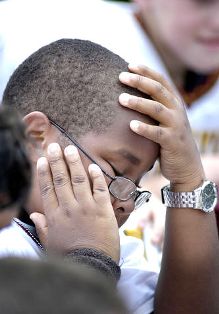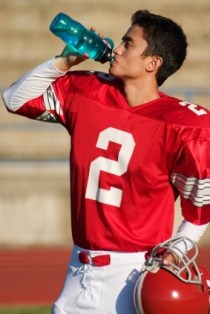September 10th, 2010 by DrRich in Better Health Network, Health Policy, Health Tips, Opinion, Research
No Comments »

It’s the dog days of what seems to have been an unusually hot summer (though DrRich does not know whether it has been sufficiently warm to affect the global cooling trend we’ve been in for the past decade), and as is all too common at this time of year, we are seeing extraordinarily heartbreaking stories (like this one) about healthy, robust young athletes dying suddenly on the practice fields.
Most of these tragic sudden deaths are due to a heart condition called hypertrophic cardiomyopathy. Hypertrophic cardiomyopathy often does not produce any symptoms prior to causing sudden death. But it can be easily diagnosed, before exercise-induced sudden death occurs, by screening young athletes with electocardiograms (ECGs) and echocardiography.
A couple of summers ago, the New York Times wrote about such an athletic screening program at the University of Tennessee. Based on the U of T’s results, “cardiologists and other heart experts say that the screenings could help save the lives of the 125 American athletes younger than 35 who die each year of sudden cardiac death.” Read more »
*This blog post was originally published at The Covert Rationing Blog*
September 2nd, 2010 by Michael Sevilla, M.D. in Better Health Network, Health Policy, Health Tips, News, Research
1 Comment »

 A study published earlier this week by the American Academy of Pediatrics states that “the number of sport-related concussions is highest in high school-aged athletes, but the number in younger athletes is significant and on the rise.” Why is this? Many believe this is from better recognition of the symptoms and the need to be medically evaluated.
A study published earlier this week by the American Academy of Pediatrics states that “the number of sport-related concussions is highest in high school-aged athletes, but the number in younger athletes is significant and on the rise.” Why is this? Many believe this is from better recognition of the symptoms and the need to be medically evaluated.
I did a couple of interviews with local TV news to talk about the subject (Video 1 and Video 2). In my research on this subject, I found an article from the Dayton Daily News stating that the Ohio High School Athletic Association (OHSAA) passed a policy in May 2010:
Any athlete who exhibits signs, symptoms or behaviors consistent with a concussion (such as loss of consciousness, headache, dizziness, confusion or balance problems) shall be immediately removed from the contest and shall not return to play until cleared with written authorization by an appropriate health care professional.
In addition, on the OHSAA website there’s an entire section devoted to concussions and head injuries. I have also read that other states have taken similar steps, especially with high school and younger athletes.
If you find the videos in this post helpful, I encourage you to see my other interviews on health-related topics at MikeSevilla.TV
*This blog post was originally published at Doctor Anonymous*
August 29th, 2010 by JenniferKearneyStrouse in Better Health Network, Health Tips, News
No Comments »

 With back-to-school time around the corner, the Centers for Disease Control and Prevention has issued a warning about the risk for heat-related illness in young athletes, especially football players, the Los Angeles Times reports.
With back-to-school time around the corner, the Centers for Disease Control and Prevention has issued a warning about the risk for heat-related illness in young athletes, especially football players, the Los Angeles Times reports.
Coaches and parents should be aware of the signs and symptoms of heat stroke, dehydration and other problems, and fluid replacement formulas should be used during practices and workouts, among other precautions, the LA Times said.
*This blog post was originally published at ACP Internist*
August 14th, 2010 by DrRob in Better Health Network, Humor
No Comments »

Dear American Academy of Pediatrics,
I think there is a mistake. Kids have recently started coming into the office with forms for sports physicals, and the form is different. See below:

Someone added stuff to the form! Not only do we have to continue the inexplicable obsession with the hernia check (for maximum humiliation of boys, we try to use only female examiners for this), there’s a bunch of new stuff. Read more »
*This blog post was originally published at Musings of a Distractible Mind*
August 12th, 2010 by Medgadget in Better Health Network, News, Research
1 Comment »

 It’s an August tradition: Football training camps open, and we’re treated to warnings about working out in the heat.
It’s an August tradition: Football training camps open, and we’re treated to warnings about working out in the heat.
In the past few years, however, when it comes to football, there’s been a new emphasis on traumatic brain injury (TBI). This has caught our eyes here at MedGadget.
We’ve covered innovative impact-sensing helmet technology before (as well as smart helmets for temperature monitoring). But for the athlete with a concussion, what happens off the field? Unless a neurologist is involved, it’s up to the players and trainers to follow guidelines or make guesses about when to return to play.
Hopefully that will change, and a device like BrainScope will lead the way. When we first covered BrainScope, they were positioning their new device, based on controversial technology, as a sideline decision-making aide. Now their research seems to be focused on the weeks and months post-concussion. Read more »
*This blog post was originally published at Medgadget*




 A study published earlier this week by the
A study published earlier this week by the 
 With back-to-school time around the corner, the Centers for Disease Control and Prevention has issued a warning about the risk for heat-related illness in young athletes, especially football players, the Los Angeles Times
With back-to-school time around the corner, the Centers for Disease Control and Prevention has issued a warning about the risk for heat-related illness in young athletes, especially football players, the Los Angeles Times 


 It’s an August tradition: Football training camps open, and we’re treated to warnings about working out in the heat.
It’s an August tradition: Football training camps open, and we’re treated to warnings about working out in the heat.







